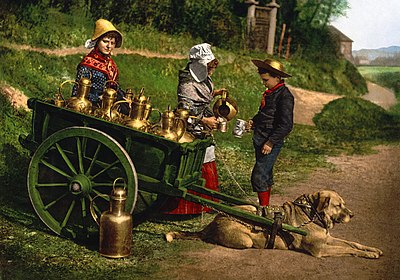I don’t know many people who “peddle” the Word of God. Paul gave a clear exhortation to his crowd, reminding that they do not peddle the Word as others were doing. “For we are not like many, peddling the word of God, but as from sincerity, but as from God, we speak in Christ in the sight of God” (2 Cor. 2:17).
While I don’t know “many” people who sling the Christian message for personal gain, I certainly know of some who do that. I think of prosperity preachers and insensitive evangelists. It’s kind of amazing to think that people would “peddle” the truth, like cotton candy hawkers at the circus, but some do.
It’s easy to read Paul’s exhortation and think Oh, thank God I don’t do that. And, indeed, most of us don’t. But as I thought about this verse more, I began to draw some comparisons between what a peddler does, and I wondered if we might have more in common than meets the eye. There’s more to the act of peddling than a greedy interest to gain. I believe Paul also hints at the nature of peddling when he gives the “put on” instruction of how Christians are to give the Gospel to the world.
Aside from the salesmanship of the work, peddling involves a certain kind of disposition toward people. Do you see this in verse 17? By nature of the antithesis Paul uses, peddlers are insincere. They don’t have a sincere interest in the people they engage. They don’t really care about people, they just care about slinging the goods. Are well-meaning Christians sometimes like this too? I know that I have sometimes reverted backward to an insincere approach to evangelism and ministry. I have lost sight of people in the work of sharing good news. Instead of being a minister of truth, I have been (in this way) a peddler. My goal has, at times, become simply to get as much “product” to market as possible, with little thought or interest in the recipients of our message.
If nothing else, realizing this error ought to continually call us back to a uniquely caring, person-focused gospel ministry. We should be attuned to how our mission might drift from ministering the gospel to administering the gospel. You see, those are two different things. To administer is sort of to manage…to organize…maybe even to peddle. Administrators administer. Ministers minister.
So Paul tells us four ways we can minister (not peddle or administer) the Gospel. We should seek to:
- Be sincere in our love and concern for people. Both Christians and non-Christians need the Gospel. But they need it in their lives, not only in their ears. So we should seek with intentionality to minister the Word of God with sincerity. How can you bring the Gospel to someone with sincere interest in him or her as a person, this week?
- Be as people sent from God. Of course, as disciple-makers we actually are sent from God. We carry an alien announcement which God brought from His world and into ours. We carry a message from God (queue up The Blues Brothers mantra). How does knowing you’re on a God-sent mission change the way you minister to other people today?
- Be a voice which echoes Christ’s. God has wrapped our identity as Christians in the identity of Jesus. We are IN Him and our lives immense from Him. And our voice or ministry of the Gospel should sound very much like that of the Good Shepherd, who cared about people as people. Have you fallen into a habit of seeing people as potential converts to win and not really as people to redeem?
- Be ministers who live under God’s eye. The well-known Latin phrase is Coram Deo. It means “before God’s face.” Throughout the Reformation and beyond, careful Christians have thought about life as constantly under the loving care and eye of God. This truth changes the way we live. We know our God is watching and we want Him to see us ministering well. Paul urges us to keep this in mind as we represent Him in the world. He’s watching us handle His Word, and we want Him to see true ministers, not “peddlers”. How does living “coram deo” change the way you think, live, and worship God in the world?


